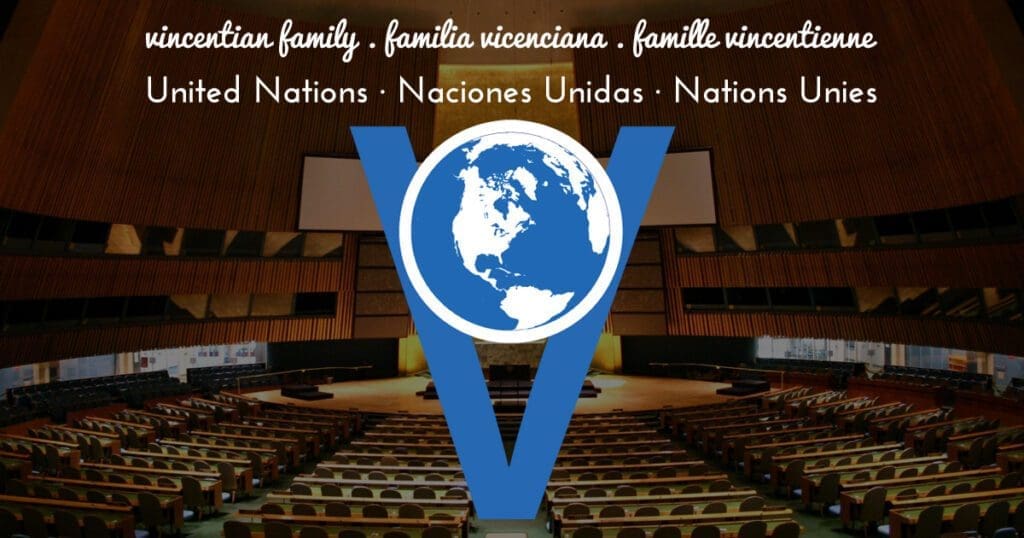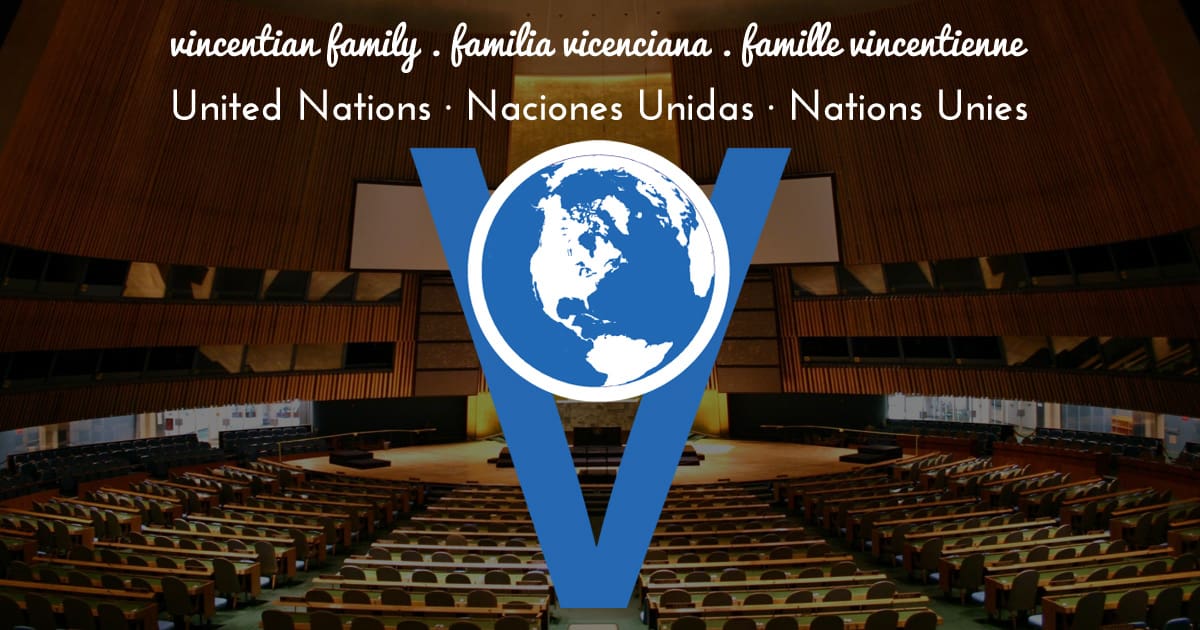The Family Participated in the High-Level Political Forum on Sustainable Development
The Vincentian Family at the UN attended and participated at the seventh session of the UN High-level Political Forum on Sustainable Development (HLPF 2019) that took place under the auspices of the UN Economic and Social Council (ECOSOC) from July 9-18, 2019.

Background
HLPF is the United Nations central hub for global follow-up and review of the progress made toward implementing the Sustainable Development Goals (SDGs). The Forum was established in 2012 at the Rio+20 meeting as a successor to the Commission on Sustainable Development. It enables full participation for all of the UN States Members and holds annual meetings under the auspices of ECOSOC. Every four years it holds a two-day meeting at the Heads of State and Government levels under the auspices of the UN General Assembly.
As part of its follow-up and review mechanisms, the 2030 Agenda for Sustainable Development encourages member states to conduct regular and inclusive reviews of select SDGs and the progress at the national and sub-national levels, which are country-led and country-driven. The voluntary national reviews (VNRs) aim to facilitate the sharing of experiences, including successes, challenges and lessons learned, with a view to accelerating the implementation of the 2030 Agenda. The VNRs also seek to strengthen policies and institutions of governments and to mobilize multi-stakeholder support and partnerships for the implementation of the SDGs. These national reviews are expected to serve as a basis for the regular reviews by the HLPF.
This Year
In additional to the annual July session under ECOSOC, HLPF will also convene for one and a half days in September 2019, under UN General Assembly. Only one outcome document will result from the two sessions.
HLPF 2019 addressed the theme, ‘Empowering people and ensuring inclusiveness and equality.’ SDGs being reviewed this year:
- Goal 4. Ensure inclusive and equitable quality education and promote lifelong learning opportunities for all
- Goal 8. Promote sustained, inclusive and sustainable economic growth, full and productive employment and decent work for all
- Goal 10. Reduce inequality within and among countries
- Goal 13. Take urgent action to combat climate change and its impacts
- Goal 16. Promote peaceful and inclusive societies for sustainable development, provide access to justice for all and build effective, accountable and inclusive institutions at all levels
- Goal 17. Strengthen the means of implementation and revitalize the global partnership for sustainable development (Reviewed every year).
Forty-seven countries conducted VNRs for HLPF 2019 to share their experiences on implementing Agenda 2030. The following countries reported VNRs for the first time in 2019: Algeria, Bosnia and Herzegovina, Burkina Faso, Cambodia, Cameroon, Central African Republic, Chad, Congo, Côte d’Ivoire, Croatia, Eswatini, Fiji, Ghana, Guyana, Iceland, Iraq, Israel, Kazakhstan, Kuwait, Lesotho, Liechtenstein, Mauritania, Mauritius, Mongolia, Nauru, New Zealand, Oman, Pakistan, Palau, Rwanda, Saint Lucia, Serbia, South Africa, Timor-Leste, Tonga, Tunisia, Turkmenistan, UK, Tanzania and Vanuatu.
In addition, Azerbaijan, Chile, Guatemala, Indonesia, Philippines, Sierra Leone and Turkey conducted VNRs for the second time.
Final comments (Outcome document will be prepared following the September meeting)
A selection of comments offered by Ms. Amina J. Mohammed, Deputy Secretary-General, at the close of the Forum:
“We have seen some important advances in data analysis and visualization this year but there remains a critical need for clear baselines and better-quality data to judge the effectiveness of our actions.
The engagement of civil society and other stakeholders continues to be one of the defining features of this Forum, but we must ensure that engagement is as meaningful and diverse as possible.”
“The Forum’s theme this year provided an opportunity to analyze issues of inclusion, empowerment and equality. It is clear from your discussions and from recent progress reports that the left behind are still being left behind. The Forum’s theme this year provided an opportunity to analyze issues of inclusion, empowerment and equality. We simply must do more — much more — to reach the most excluded and discriminated in our societies — including migrants and refugees, women and girls, and persons with disabilities. We must respond with greater urgency to the moral shame that is world hunger and to the risks facing hundreds of millions of people living in fragile and conflict-affected contexts. We must channel greater investment towards the full empowerment and employment of young people, We must speed up – not fall back – on our push for gender equality. And we truly must come to terms with the requirements of SDG10 – recognizing that extreme inequality is never inevitable.”
“Over the past two weeks, governments, civil society organizations, the private sector and many others highlighted the importance of effective, transparent and accountable institutions in achieving the SDGs.
Effective institutions – that live by the principles of the 2030 Agenda – will form the bedrock for successful SDG implementation. “
“Climate change permeated so much of the Forum’s work this year. At the Secretary-General’s Climate Action Summit, leaders can demonstrate their commitment to respond to the climate emergency, with clear plans that are fully aligned with a 1.5 degree world.”
Natalie Boone is the AIC NGO Representative to UN-NY

Tags: United Nations







0 Comments